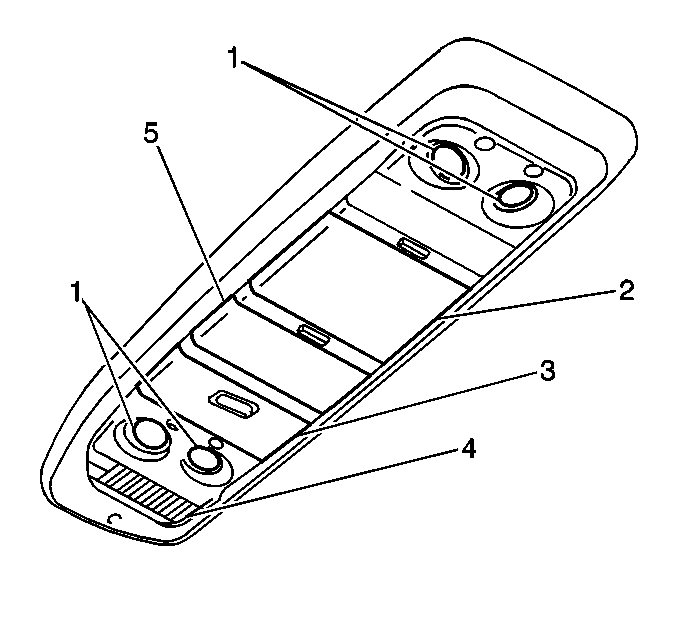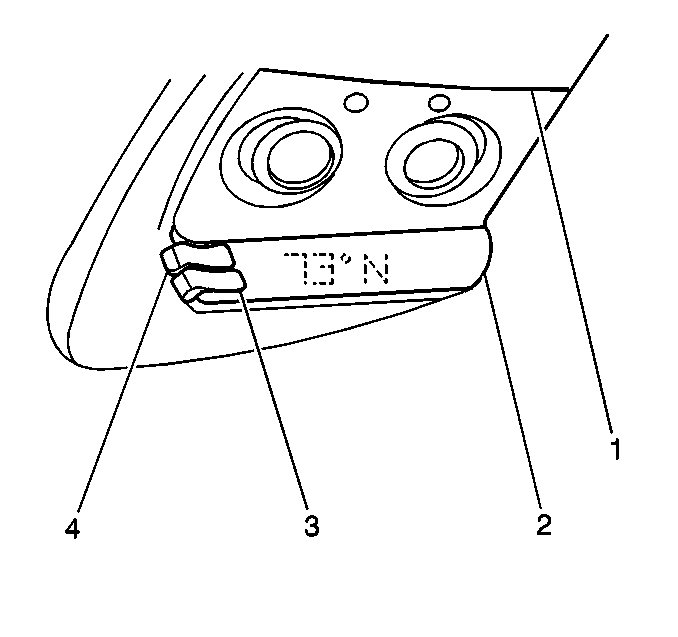Overhead Console

The overhead console is a convenience package which contains some or all of the following features:
| • | A multi-function electronic display (4) that indicates the outside temperature and the direction that the vehicle is facing |
| On some models, the display is also used for the driver information system. |
| • | A compartment for a garage door opener transmitter that can be adapted to many brands of transmitters |
| The transmitter can be activated by pressing the button on the compartment door. |
| • | A universal transmitter that can be programmed to replace up to three hand-held transmitters |
| • | A compartment for storing sunglasses |
| • | A compartment for compact disc or cassette tape storage |
| • | A dome lamp |
| • | A location for the sunroof switch, if equipped with a sunroof |
Button Operation
The two button user interface consists of the following switches:
| • | US/MET |
| • | MODE |
The US/MET switch allows the user to toggle the display readout between the English and the metric systems.
The MODE switch serves the function of toggling the display between the following modes of operation:
| • | OFF |
| • | COMP/TEMP |
| • | TRIP |
Once in the TRIP mode of operation, the MODE switch served to step the user through the TRIP functions. Refer to the following table for information about the applicable states and the sequencing order of the MODE switch.
Sequence | Function |
|---|---|
1 | Display Off |
2 | Compass and Outside Temperature |
3 | Average Fuel Economy |
4 | Instantaneous Fuel Economy |
5 | Trip Range |
6 | Fuel Used |
7 | Average Speed |
Display Dimming
Display dimming follows the radio dimming characteristics. Upon activation of the park lamp, the display dims to the maximum brightness in the dim mode. Further dimming is controlled by the analog dimming signal of the IP dimming control. The display goes blank when the IP dimming control is at the lowest setting.
Temperature Display Operation

The outside temperature is displayed on the electronic display (2). The electronic display is located at the front of the console. Temperature readings may be displayed in either degrees Fahrenheit (°F) or degrees Celsius (°C). Pushing the US/MET switch (4) that is located on the left side of the display alternates the temperature readings between Fahrenheit and Celsius. If the outside temperature is 3°C (37°F) or lower, the display toggles between the word ICE and the current temperature every eight seconds in order to warn the driver of the possibility of icy road conditions.
The outside temperature is measured from a sensor that is located behind the front grille. In this location, heat from the radiator may warm the sensor above the actual ambient temperature if there is insufficient airflow across the sensor. In order to prevent false temperature displays, the electronic module monitors the vehicle speed. The vehicle speed must meet certain conditions before the module displays a new reading from the sensor. If the vehicle speed is less that 29 km/h (18 mph), the temperature display is not updated. If the vehicle speed is between 29-58 km/h (18-36 mph), the temperature display is updated at a slow rate. If the vehicle speed is over 58 km/h (35 mph) for longer than 2 minutes, the sensor will be at the correct ambient temperature. The display then updates continuously in order to reflect the ambient temperature more accurately.
When the vehicle is first started, the electronic module uses an internal timer in order to determine how long the vehicle has been turned off. If the vehicle has been turned off for less than four hours, the sensor may be warmer than the actual ambient because the engine and the radiator may not have cooled down yet. In order to prevent a false temperature from being displayed, the electronic module displays the same temperature as when the vehicle was last turned off. A new sensor reading is not displayed until the vehicle speed meets the above mentioned criteria. If the vehicle has been off for more than 4 hours, the module takes an immediate temperature reading from the sensor and displays that temperature. Further updates then must meet the vehicle speed criteria.
Temperature Will Not Rise
The temperature routines do not allow a displayed temperature to rise unless the vehicle is in motion. Motion of the vehicle is determined by a vehicle speed message that is received from the PCM/VCM. The temperature does not increase if there is a speed sensor failure and the speed sensor received a message that is inaccurate.
